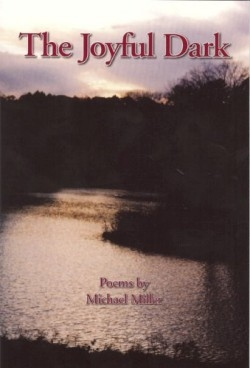
The Joyful Dark
In The Joyful Dark, Michael Miller confronts the traditional role of nature poet. The very first image is of a praying mantis biting off the head of her mate, a reminder of the violent undercurrents ever present in the natural. This violence floods into the speaker’s romantic relationships in which he promises, in “Bones,” “If you can see beyond / My deceptions, my cruelty, / I will amputate my hands / And love you with my stumps.” Such obsession is the mantle of a young lover, but this collection moves far beyond those first inflamed moments. Born in 1940, Miller has the luxury of perspective, and The Joyful Dark in some ways is a narrative of a life, or at least of a relationship.
After the violent couplings of the first poem comes violent birth: “the spongy placenta ripped, / The clots poured like roses” (“Natural History”). In Miller’s hands, nature is seen clearly, as both something awful and awe-inspiring. His philosophical roots are with the sublime, and his poetic roots are with the Romantics. There is perhaps something of Percy Shelley and his “To a Skylark” in Miller’s “Aviary” poems, a sequence of five poems praising various birds. The poet is particularly sympathetic toward these creatures, even the territorial cardinal and ominous crow. However, it not Shelley who is evoked by the poet, rather his American descendant, Henry Wadsworth Longfellow.
In his own right, Longfellow is an appropriate literary figure to appear in The Joyful Dark. The scene from Longfellow’s life depicted by Miller—that of his wife’s tragic death by fire—encapsulates the union of love and death that is a leitmotif running through this collection. Because of this theme, the final images of the poet and his wife, gentle even in their remaining passion, come as a relief. The book sets its readers up for tragedy—the seemingly usual result of love—and gives wisdom instead.
Miller has waited patiently for his chance to share such wisdom. This book is his debut collection of poems and was selected as Editor’s Choice in the Robert McGovern Series of the Ashland Poetry Press. He is also the author of various short stories and a play, Transplants, which won the 1985 New England Playwriting Competition. As in “Hummingbird” from the “Aviary” sequence, Miller is “A transient messenger / Disturbing the silence.”
Disclosure: This article is not an endorsement, but a review. The publisher of this book provided free copies of the book to have their book reviewed by a professional reviewer. No fee was paid by the publisher for this review. Foreword Reviews only recommends books that we love. Foreword Magazine, Inc. is disclosing this in accordance with the Federal Trade Commission’s 16 CFR, Part 255.
